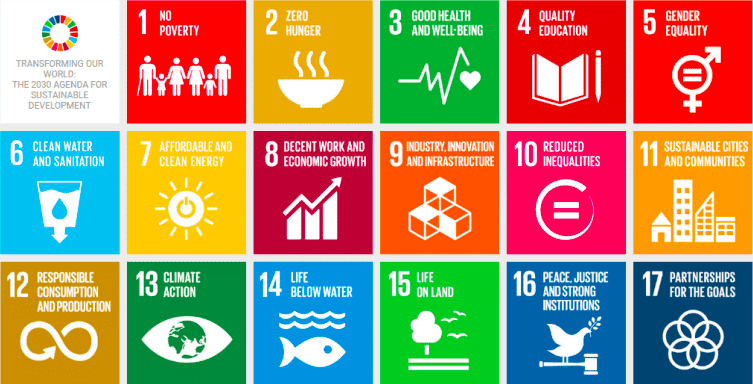Let's see how these goals can be applied to your EU-funded programme.
The SDGs or Sustainable Development Goals are a series of goals that have been integrated into the UN’s 2030 Agenda for Sustainable Development since 2015. The Agenda has been adopted by the 193 nations that make up the United Nations and, therefore, the 17 SDGs that integrate and seek to chart a 15-year path towards a more sustainable future, based on three pillars: economic, social and environmental development.

Source: FAO
Dimensions of the SDGs
These seventeen SDGs are integral and dependent on each other, in the sense that developing one SDG helps to advance the others.
Being interrelated, the SDG can be divided into three main dimensions: people, processes and planet.
- Society: focuses on the human dimension of development.
- Biosphere: for natural resources and the climate
- Economy: for economic and institutional development
Integrating the SDGs into the programmes for the promotion of agricultural products
In this context, it is appropriate to link the content of the SDGs to the development and implementation of the proposals of the agri-food promotion programmes.
Through the development topics AGRIP-SIMPLE-2021-IM- SUSTAINABLE and AGRIP-MULTI-2021-IM-SUSTAINABLE, and the inclusion of a sustainability justification section for all programmes, whether MULTI or SIMPLE, the EU ensures that proposals fall within this promotion policy that will directly and immediately contribute to increasing the sustainable production and consumption of EU agricultural products.
A good way to justify and promote this sustainable aspect for the agri-food promotion programmes is through the correlation between sustainable activities, methods and consumption and the SDGs. This is possible by directly linking the goals that are best suited to the sustainable promotion of agri-food products. Some examples could be:
SOCIETY
SDG 3: Good health and well-being
This objective can be justified through animal welfare initiatives, nutritional improvements in food, improved hygiene technologies on farms and crops, or promoting healthy eating.
SDG 4: Quality education
Through promotional activities such as workshops on healthy and sustainable food, nutrition education and awareness of sustainable production processes, targeting adults and children.
ECONOMY
SDG 12: Responsible production and consumption
This goal can relate to initiatives that promote sustainable methods of production and consumption such as using less antibiotics with livestock, promoting seasonal agriculture, addressing biosecurity issues or promoting less water use in production processes.
SDG 14&15: Life on land and below water
Through animal welfare initiatives, sustainable production, support for indigenous livestock, fisheries and agriculture, and campaigns to protect endangered species, this SDG can be included as a justification for sustainable processes in each programme.
SDG 17: Partnerships for the goals
Collaborating with public and private institutions in promoting sustainability initiatives can give a lot of weight to the sustainability part of an AER proposal, listing joint work projects, studies and other projects in which you have been involved.
BIOSPHERE
SDG 7: Affordable and clean energy
Through the promotion of farming, livestock farming, promotion and distribution methods that use renewable and clean energy, it is possible to give weight to the sustainability part of the agri-food promotion programmes proposals.
SDG 13: Climate action
In this objective of the process dimension, initiatives such as promoting research into livestock diseases and improving sustainable crops, promoting cleaner chain production, supporting better application of technology to production and distribution processes and promoting initiatives such as reducing salt in products or the use of polluting pesticides can be related to this objective.
The importance of sustainability in the promotion of agricultural products
Recently, the requirement to include a section exclusively dedicated to sustainability in the elaboration and presentation of the proposals for the promotion of agricultural products has been introduced. Promoting international promotion methods that favour a greener image of European products is a prerequisite for the development of an effective programme proposal that can be approved by the European Commission.
It is therefore important and necessary to keep the sustainability factor in mind when developing a proposal to submit an agri-food promotion programme. This is a very favourable feature to highlight the products and their production methods, promoting an ecological and environmentally friendly image of European products that will support other possible qualities such as the quality of the production methods or the organic product designation.
Reach out to us if you have questions or are considering getting funds for your organisation through European funding for the promotion of agricultural products, we will be delighted to help and support you all the way. Email us at hello@atlasmarketingstudio.

